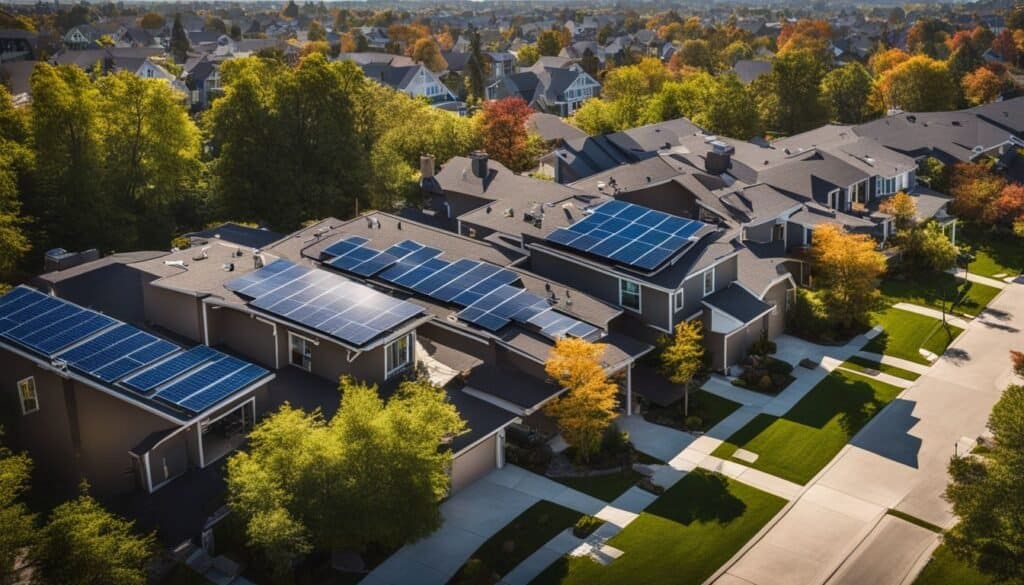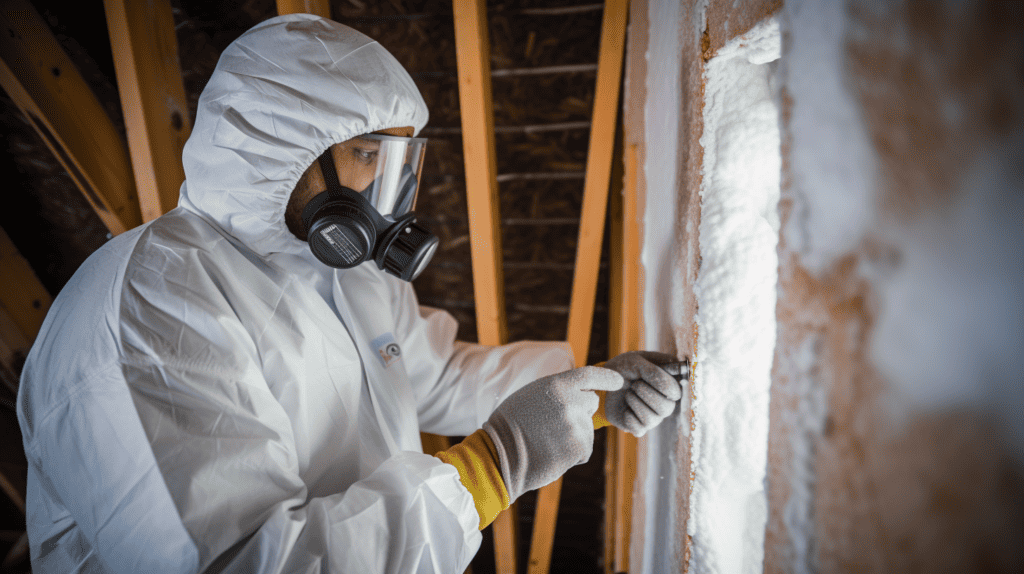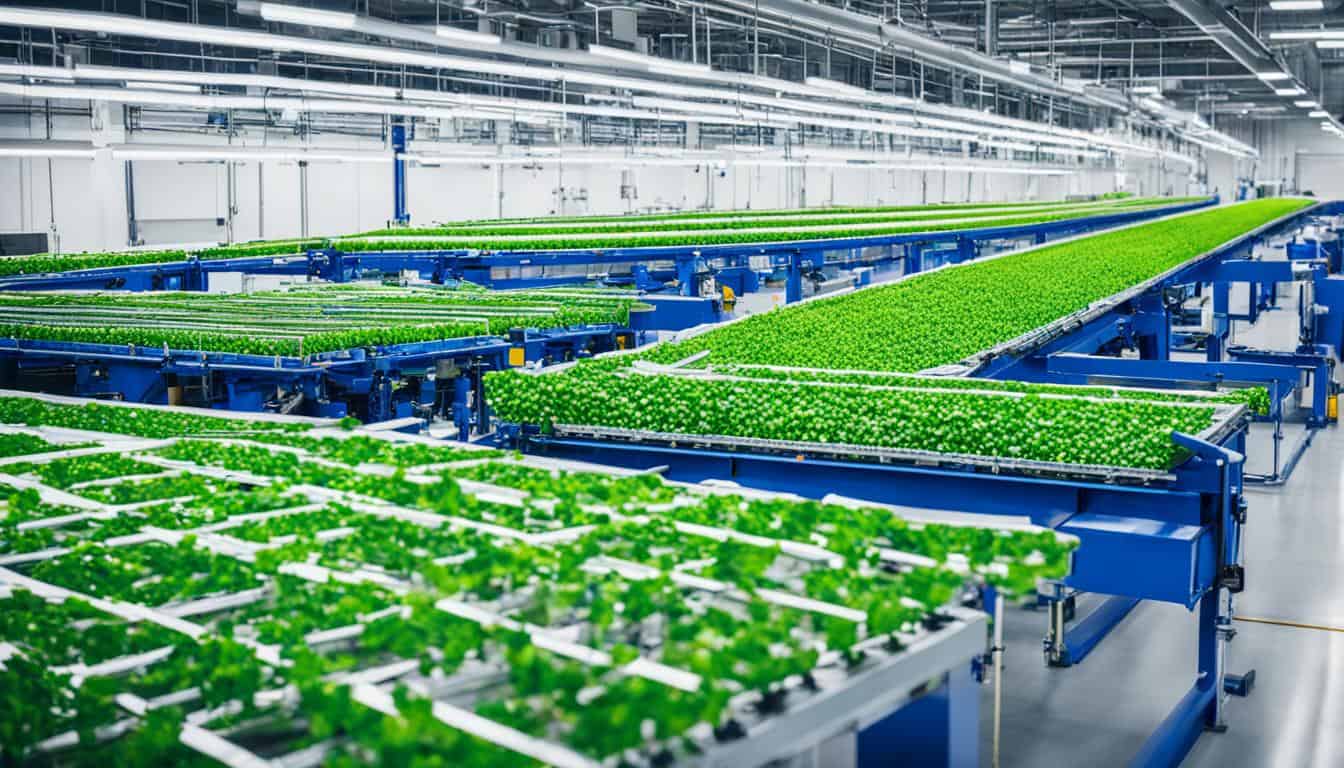This article provides practical tips for enhancing energy efficiency across buildings, industries, and homes, offering solutions tailored to various needs. Discover how smart changes make big differences!
Key Takeaways
- Energy efficiency means using less power to get the same job done, which saves money and protects the environment.
- Smart choices in our homes, like sealing leaks and using LED bulbs, can cut down on energy use and lower bills.
- Strong rules by governments help make buildings and industries more energy efficient, leading to cleaner air and fairer access to power for all.
- Regular check-ups of machines in factories and good insulation in homes are key steps to save energy.
Understanding Energy Efficiency
Grasping the concept of energy efficiency is pivotal; it’s about maximizing output while minimizing the amount of energy required. This principle not only plays a crucial role in clean energy transitions but also becomes increasingly relevant as we strive to address global challenges with actionable solutions.
Embracing efficient practices promises a path toward sustainability, underscoring our collective need for conscientious action in preserving resources for future generations.
What is energy efficiency
Energy efficiency is about using less energy to do the same work. This smart way of using power helps us cut down on our energy bills and fight pollution. Think of it like getting more miles out of a gallon of gas in a car that’s built to run smoother and go further without wasting fuel.
It matters a lot because it helps the planet by making fewer greenhouse gases. It also means we don’t need as much energy from other countries, and that can lower what families and everyone spend on power.
We’re heading toward cleaner energy by using energy smarter in our daily lives, from lighting our homes to powering huge factories. Now, let’s see why saving energy is so essential for all of us!
Why is it important
Being smart with energy use is vital to protecting our planet. It cuts down on harmful gases that can hurt the air we breathe. When we make our homes, businesses, and factories better at using energy, we keep more money in our pockets.
Plus, being efficient helps everyone have equal access to energy since it can make costs lower for all.
Using less power does a big job for us, too—it keeps our earth clean and makes sure there’s enough energy to go around. We need it because one day, the stuff that powers everything might run out if we’re not careful.
So making every bit of energy work harder means a brighter future for you and me.
These savings also matter for companies big and small. They spend less on power bills, which helps them do better than their competitors. And when businesses save on power costs, they might even have some extra cash to pay their workers more!
Now, let’s talk about how buildings can become champions of saving energy.
The role in clean energy transitions

Energy efficiency is crucial in moving toward clean energy. It helps us use less energy from sources that pollute the air and harm our planet. This means we can fight against climate change better.
With buildings and industries using energy in smarter ways, we make a big dent in the CO2 going into the sky. We also get ready for more solar power and wind power to take over.
When we work on energy efficiency, it sets up a strong base for these cleaner energies to grow. We save money and protect Earth’s future at the same time. People start depending less on fuels that run out and cause pollution.
Now, let’s talk about how saving energy also saves cash.
The need for action
Making our energy use smarter is not just a good idea; it’s necessary. We are using too much energy, and this leads to problems like high bills for families and dirty air from power plants.
To stop wasting energy, we have to act now. This means changing how we build houses, run factories, and live at home.
Direct Energy suggests that sealing cracks, gaps, and leaks in your home and adding insulation can save up to 10% on home heating and cooling costs
Small steps can lead to big changes. If everyone starts saving a little bit of energy daily, we can help the planet and our pockets. Adding insulation in our homes or picking appliances that use less electricity are easy ways to start.
It’s up to us to make sure we’re not throwing away energy when we could be saving it instead. Let’s fix things today so the future will be brighter!
Benefits of Energy Efficiency
Energy efficiency not only safeguards our environment and reduces utility bills, but it also promotes social equality by making energy more accessible and affordable to all. Dive deeper into how implementing energy-saving measures can enrich your life while contributing to a larger global benefit.
Protecting the environment
Saving energy helps protect our planet. When we use less power, we also make less pollution. Cutting down on the gases that come from cars and factories means cleaner air and a happier Earth.
Buildings, homes, and industries can all do their part by using energy in smarter ways.
This keeps the land, water, and air safe for animals and people. By being more careful with energy, everyone wins – it’s good for your wallet and great for nature too! Now let’s look at how saving money is another big plus of using energy wisely.
Saving money
Protecting our environment also leads to another great advantage: putting more money in your pocket. Making your home or business more energy efficient means you use less power. This can lower your monthly bills a lot.
When you use energy-saving lights, appliances, and smart systems, you don’t need as much electricity from the power company. Plus, being smarter with how we use energy can stop us from having to build new pricey power plants.
Buildings and homes that get an upgrade to save energy are not just nice to live in; they’re also cheaper to run. Businesses find big wins here too because using less energy means spending less on utilities every month.
Keep machines well-kept and up-to-date so they don’t waste power either. This helps everyone save cash that can be spent on other important things instead of just paying for wasted electricity.
Addressing energy equity
Saving money through energy efficiency is great, but it also helps ensure everyone has equal access to energy. This means people with less money don’t have to spend as much on their power bills.
When we make buildings, homes, and industries use less energy in smarter ways, it can help all kinds of families. We think about who really needs the benefits when we set up programs for saving energy.
Department of Energy recommends covering drafty windows with heavy-duty, clear plastic sheets or tape clear plastic film to the inside of window frames during cold months to reduce infiltration.
Energy equity sees that different communities may need more support as they might face higher barriers to making their homes or businesses more efficient. Programs are there to cut down monthly costs for those who find paying for energy hard.
They build stronger neighborhoods by making sure people don’t have too big a load from their utility bills. This fairness lets everyone enjoy cleaner air and better health from using less power at home and work.
Examples of Energy Efficiency
When exploring the realm of energy efficiency, we see transformative examples all around: buildings with advanced climate control systems that minimize waste while maximizing comfort, industrial processes refined to use less energy without compromising output, and homes lit by LEDs and equipped with smart thermostats that learn our habits to optimize heating and cooling.
In buildings
Buildings, both homes and commercial ones, use a lot of energy. They take up about 40% of the energy we use in the United States. To make buildings more energy-efficient, people design them to get the most from natural light and heat from the sun.
This is called passive solar design. It helps reduce the need for electric lights and heating systems during daylight hours.
Another smart move is using high-quality materials that keep buildings warm in winter and cool in summer. Good insulation stops heat from escaping or entering too easily, which means less energy used for heating or cooling rooms.
Smart technology can also play a big role by automatically adjusting things like lighting and temperature when needed.
Next up: let’s see how the industry can save on power!
In industry
Moving from buildings to factories and plants, energy efficiency takes on another important role. Industries can make things at a lower cost when they use less energy. This is good for business and the environment.
By putting in place technologies that use power better, companies cut down on how much they need. This means we can make more without needing more power plants or resources.
Factories should switch to renewable energy sources, like solar or wind power, whenever they can. It’s also smart for them to keep their machines well-maintained and up-to-date with new tech that uses less energy.
Regular check-ups help catch problems before they waste power or money. Using these strategies makes sure industries stay ahead by using less while making more.
In homes
In homes, energy efficiency is key to cutting down on power use and saving money. By picking houses with smart features like good insulation, efficient heating systems, and Energy Star appliances, people can make a big difference.
Simple changes such as sealing leaks around doors and windows help keep the home warm in winter and cool in summer without wasting energy. Smart thermostats can adjust the temperature when no one is home to save even more.
Upgrading to LED bulbs also reduces energy costs and lasts longer than traditional ones. These steps not only cut your bills but also protect nature by using less resources from our planet.
To push this further, homeowners should consider an energy audit to find ways their house could work better at saving power. Making these improvements leads straight into thinking about how we create smarter buildings overall.
Tips for Maximizing Energy Efficiency

Adopting a comprehensive policy package tailored to specific energy needs can create a robust framework for sustained efficiency. Expanding the reach of efficiency regulations ensures that new and existing infrastructures comply with modern standards, leading to widespread improvements across sectors.
By conducting an energy savings audit, you pinpoint precise areas where consumption can be curbed; this proactive measure guides decisions on which equipment upgrades offer the most impactful returns.
Prioritize retrofitting buildings as it often yields significant reductions in energy use and greenhouse gas emissions, enhancing both environmental sustainability and cost savings for years to come.
Adopt comprehensive policy packages
Make energy efficiency a big deal by using good rules and plans. These packages include laws that everyone must follow to save energy. They make sure that buildings, factories, and homes use less power.
With smart policies, we can see better air, less waste, and more money saved.
Governments should work together on this. They need to think about how saving energy helps in all areas like schools, roads, and hospitals. Energy-efficient policies lead to cleaner places to live and fair chances for everyone to have good energy choices.
This is how we build stronger communities with the power that’s safer for our planet.
Expand coverage of efficiency regulations
To make more buildings and factories use less energy, we need stronger rules. These rules tell builders and companies how to save power. Local governments are already saving money and cutting pollution by using less energy in their places.
They show that good rules can lead to big changes.
Having strict rules helps industries move faster towards using clean energy. This means factories can work just as well but harm nature less. Next, let’s find out about energy audits! They are a great way to spot where we’re wasting energy so we can fix it.
Conduct an energy savings audit
Check your home or building to find where you can save energy. An energy audit will point out spots that need fixing so you use less power. It’s a smart move before you start changing things to cut down on energy use.
Experts come to look closely at how your place uses electricity and heat. They tell you what works well and what does not. You can then fix the bad parts to stop wasting energy.
Getting an audit helps you make the right choices for saving money and power in the long run. Think of it like a doctor check-up for your house or building’s health! After the audit, plan out which steps are best for reducing energy costs and helping our planet stay clean.
Replace old and inefficient equipment
After you look at how much energy you use, think about getting rid of equipment that uses too much power. Old machines and devices often waste energy. They can cost a lot more to run than newer ones.
There are better options now that save power and work well.
Choose new tools and appliances with care. Look for ones that have good ratings for using less energy. These can help lower your bills and be kinder to the environment. It’s wise to switch out things like old fridges or air conditioners before they break down.
This way, you save money over time and use less power immediately.
Prioritize retrofitting buildings
Making old buildings more energy efficient is a big deal. It can save lots of energy, cut down bills, and cost less to run places like homes and offices. Think about fixing up your building to make it better at saving energy.
This could mean adding new insulation or installing smart systems that help control the use of lights and heat.
PODS points out the importance of a free energy audit, as many utility providers offer this service to examine the energy use in your house and past energy bills.
Many buildings haven’t been updated yet, but they should be because you can get back up to half the energy used with retrofits. Taking steps to improve an old building not only saves money but also makes it nicer for everyone inside.
Next, let’s explore how we design new buildings with energy efficiency in mind!
Implementing Energy Efficiency in Buildings

To revolutionize energy use, buildings can integrate energy-efficient design principles that optimize sunlight for natural heating and lighting while advanced smart home technologies facilitate meticulous control over internal climates.
Proper insulation and sealing are crucial in minimizing heat loss, ensuring every watt of energy contributes to a comfortable, sustainable living or working space.
Energy-efficient building design
Making a building energy-efficient means balancing how it uses different types of energy, like the sun and wind. We design buildings to use less power for heating, cooling, and running things inside.
This cuts down on energy costs and helps keep our air clean by lowering harmful emissions from power plants.
Energy-smart designs can have big windows facing the sun to get free heat and light. They might use unique materials in walls that keep the building warm in winter and cool in summer.
These intelligent choices reduce the amount of electricity or gas we need, making our homes and offices more comfortable while saving money and protecting nature.
Use of smart home technology
Building on energy-efficient design, smart home technology takes saving power to the next level. Smart thermostats, lighting systems, and appliances connect to a network you can control from your phone or computer.
This lets you manage when and how you use energy in your house. For example, heating or cooling can turn off when no one is home.
Smart devices give reports on how much energy you’re using, too. With this info, you can see where to cut back on power use. People who use these technologies often pay less for their energy bills because they only use what they need.
They help keep our planet clean by lowering the amount of energy homes need.
Proper insulation and sealing
Keeping your building cozy and energy-smart starts with great insulation. Think of it like a warm blanket for your home. With the right “R-value,” that’s a big number on the label telling you how good it is at keeping heat in, you can stay toasty and save cash.
Sealing up drafts around doors and windows is just as key. It stops cold air from sneaking in and warm air from leaking out.
Now, picture putting together a giant puzzle made of building parts – that’s what off-site construction does for commercial spaces! They make sure all pieces fit tight so there are no gaps or leaks before they even get to the site.
This technique ensures the whole building’s shell is sealed up right, helping keep the indoor climate perfect without wasting energy.
Energy Efficiency in Industry
Revolutionize your industrial operations with cutting-edge energy-efficient technologies that not only trim down costs but also bolster your commitment to environmental stewardship.
Dive into a world where renewable resources and smart maintenance redefine productivity—explore the powerful ways you can boost efficiency in the industry today.
Use of renewable energy sources
Renewable energy sources like solar, wind, and water help reduce the use of dirty fuels. They turn sunlight, wind, or flowing water into power without making a mess. Buildings can get a lot of their power this way.
Industries that switch to these clean energies don’t rely much on fossil fuels anymore.
Using renewables makes our air cleaner. It also cuts costs over time because the sun and wind are free once the setup is in place. This intelligent move helps everyone by using less energy from outside sources.
Plus, it fights against climate change by lowering harmful gases that go up into the sky.
Implementation of energy-efficient technologies
Putting energy-efficient technologies to work can make a big difference. Industries use them to cut down on the energy they need and keep things running smoothly. For example, advanced machinery that uses less power helps companies do their jobs without wasting energy.
Buildings can be fitted with systems that adjust lighting and heating automatically, saving electricity.
Regular check-ups and fixing machines when needed also play a part in using less energy. This makes sure equipment stays efficient for extended periods, helping industries save money and protect the environment.
Let’s look at how we can save even more by focusing on our homes.
Regular maintenance and upgrades
Installing energy-efficient technologies is smart, but keeping them in top shape is just as crucial. Machines and systems need regular checks to ensure they run at their best.
This can help cut down on costs and use less energy. Think of it like caring for a car – changing the oil and checking the tires makes the car run better and use less gas.
Upgrading old equipment can also boost efficiency. When you replace parts that are worn out or install newer models, you save more power. These steps ensure your machines do their jobs without wasting extra energy.
They keep buildings, industries, and homes using only what they need, which helps our planet and wallets.
Energy Efficiency in the Home
In pursuing a greener lifestyle, implementing energy efficiency within our homes is both a practical and impactful step. We can significantly decrease our electrical consumption by embracing technology like LED lighting and Energy Star-rated appliances.
Proper appliance maintenance ensures that systems run at peak performance, avoiding wasteful energy use and extending the life of our investments. Simple acts such as unplugging devices when not in use or investing in programmable thermostats contribute to reducing our carbon footprint while also shaving off dollars from energy bills.
Through water-conserving fixtures and behaviors, we save on utility costs and support broader environmental conservation efforts. As homeowners become more conscious of their energy patterns, small adjustments accumulate into substantial benefits for personal finances and planetary health.
Properly maintaining appliances
Keeping your home appliances in good shape helps them use less energy. Make sure to clean and check them often. This can mean cleaning out the lint filter in your dryer or making sure the fridge door seals tight.
If an appliance breaks, fix it fast so it doesn’t waste energy. Sometimes, getting a new, more efficient model is the best choice to lower energy costs.
A well-maintained heating and cooling system also uses less power. Change filters regularly and have a pro look at your system each year. This keeps it running smoothly and means you use less energy to stay warm or cool at home.
Using energy-efficient lighting and appliances
Switching to energy-efficient lighting and appliances is a smart move. New light bulbs like LEDs use much less electricity and last way longer than old ones. Imagine saving up to 75% on your home’s lighting costs just by changing the bulbs.
Plus, when your fridge, washer, or oven is energy-efficient, it uses less power too. This means lower bills for you every month.
Energy efficiency doesn’t just keep money in your pocket—it’s also good for our planet. Efficient gadgets mean we don’t need as much energy, so there’s less pollution from power plants.
And better products do their job without wasting resources; that’s a win-win for everyone! Look out for windows and machines that have an “energy star” label—they’re the top choice to help you save energy at home.
Conserving water
Saving water helps us use less energy, which is good for our planet and our wallets. Remember, when you use hot water in your home, it costs money because that water needs to be heated up.
Cutting back on how much hot water we use means we don’t need as much energy. This is why having things like faucets that don’t let a lot of water out at once can make a big difference.
They help us use just enough water without wasting any.
Choosing the right fixtures like showerheads and taps that save water can lead to huge savings over time. If you collect rainwater or reuse it, you’re not only saving clean drinking water but also cutting down on the energy needed to treat and move that water.
Now, think about lighting – another way to save both money and energy in your home!
Programs and Partnerships for Energy Efficiency
Within the sphere of sustainable progress, programs and partnerships play a pivotal role in advancing energy efficiency. The “Energy Efficiency in Emerging Economies” program is tailored to assist burgeoning markets in heightening their energy use strategies, while the “Digital Demand-Driven Electricity Networks Initiative” leverages cutting-edge technology to refine electric grid operations.
Meanwhile, the “Energy End-uses and Efficiency Indicators Data Explorer” provides a reservoir of data for policymakers and industry leaders to shape effective energy conservation measures.
These collaborative efforts underscore a commitment to immediate savings and long-term resilience, and reduction of global energy demand.
Energy Efficiency in Emerging Economies
Emerging economies have much to gain from energy efficiency. The International Energy Agency’s Emerging Economies (E4) Programme teams up with six big players on the global stage to help them use energy better.
This move towards efficiency helps these countries grow in a smart way while taking care of the planet. Jobs pop up and people keep working as these nations learn to manage energy smarter.
Better use of energy cuts costs and makes sure there’s enough power for everyone. For emerging countries, this means building a future where they’re ready for anything without wasting resources or harming nature.
Investing in projects that save energy is key, and it brings benefits like cleaner air and more money saved for homes and businesses alike. Moving forward, let’s explore how “Digital Demand-Driven Electricity Networks Initiative” changes things even more.
Digital Demand-Driven Electricity Networks Initiative
The Digital Demand-Driven Electricity Networks Initiative is making energy systems smart. It uses technology to link buildings, cars, and factories in a way that manages electricity better.
This helps cut costs and makes less pollution. With smart networks, each part can talk to the others so that they use power when it’s cheaper and greener.
Smart tech not only saves money but also keeps the air clean by using energy wisely. These networks are a big step toward using less energy without losing comfort or productivity. Next up: how exploring data on how we use energy can help us be even smarter with our choices.
Energy End-uses and Efficiency Indicators Data Explorer
Energy End-uses and Efficiency Indicators Data Explorer is a handy online tool. It lets you see energy demand and how well we use energy. You can find yearly data from 2000 on this site.
It shows how much energy different things consume and the carbon emissions they cause. This tool also has energy indicators, which are special measures to help people understand changing energy uses over time.
To make smart choices about reducing energy consumption, having accurate information is key. Energy experts, policy makers, and anyone interested in sustainable energy can look at patterns of use with this resourceful database.
They can then figure out where improvements are possible for buildings, industries, or homes. Next up is learning about programs that work together for better energy efficiency.
Conclusion on Building Energy Efficiency
Saving energy makes a big difference for our planet and our wallets. Small steps like sealing leaks or choosing the right light bulbs add up to big savings. Businesses can cut costs by using less power during busy times.
At home, keeping appliances in good shape means they use less energy too. Let’s all work together to use energy wisely and make the future brighter!
FAQ on How to Improve Energy Efficiency
Q: What are some benefits of improving energy efficiency in buildings and industry?
A: Improving energy efficiency can lead to cost savings, reduced environmental impact, increased comfort, and better energy security.
Q: How can I use less energy in my home or office?
A: Using energy-efficient appliances, upgrading insulation, optimizing heating and cooling systems, and implementing smart energy management practices are some ways to use less energy.
Q: What are some common energy efficiency standards for buildings and industry?
A: Common energy efficiency standards include HVAC system efficiency requirements, building envelope standards, and lighting energy efficiency standards, among others.
Q: What are some key strategies for maximizing energy efficiency in buildings and industry?
A: Key strategies include conducting energy audits, implementing energy-efficient technologies, optimizing operational practices, and investing in renewable energy solutions.
Q: How can energy efficiency projects be initiated and implemented in buildings and industry?
A: Energy efficiency projects can be initiated by conducting energy assessments, identifying improvement opportunities, securing funding, and implementing efficiency measures such as retrofitting and upgrades.
Q: How does improving energy efficiency contribute to environmental sustainability?
A: Improving energy efficiency can reduce greenhouse gas emissions, minimize resource consumption, and mitigate the environmental impact of energy production and consumption.
Q: What role do energy efficiency policies play in promoting efficient energy use?
A: Energy efficiency policies set standards, provide incentives, and drive investments to promote efficient energy use, address energy security, and contribute to economic and environmental goals.
Q: How can industry and buildings contribute to reducing energy use and promoting energy efficiency?
A: Industry and buildings can contribute by adopting energy-efficient technologies, implementing efficiency improvements, and integrating energy management practices to reduce energy consumption and promote energy efficiency.
Q: How can individuals and organizations invest in energy efficiency for their homes or facilities?
A: Individuals and organizations can invest in energy efficiency by adopting energy-efficient solutions, seeking financial incentives, and collaborating with energy efficiency and renewable energy programs and initiatives.
Q: How can energy crisis be mitigated through efficient energy use and energy efficiency measures?
A: Mitigating energy crisis requires leveraging efficient energy use, investing in energy efficiency measures, promoting renewable energy adoption, and implementing policies and initiatives that prioritize energy security and resilience.





Leave a Reply